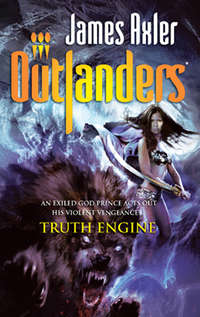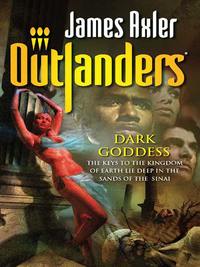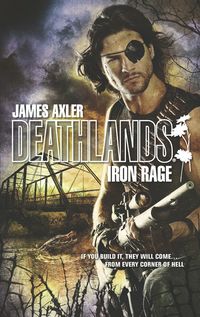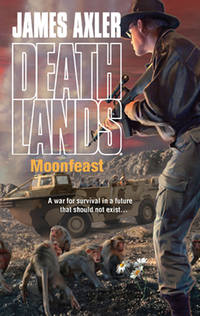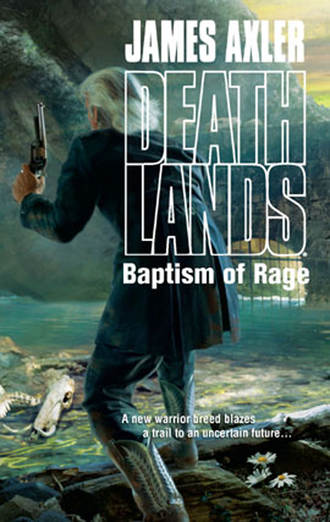
Полная версия
Baptism Of Rage

“You strong boys going to help with these chains, or what?”
Ryan and Jak leaped from the wag and followed Mitch into the shed while Annie remained in the passenger seat. Jak glanced back, making sure that the woman wasn’t reaching for the shotgun that was nestled in a rig beside her.
“It’s just through here,” Mitch stated as Ryan trailed him into the shadows of the outbuilding.
The one-eyed man flexed the muscles of his hand, reaching beneath his coat for the holstered SIG-Sauer. He didn’t trust Mitch or the woman, and he cursed himself for getting into this situation. If Mitch could help them, that was fine.
But this felt increasingly wrong.
Baptism of Rage
James Axler
Death Lands®

Youth is wasted on the young.
—George Bernard Shaw
1856–1950
THE DEATHLANDS SAGA
This world is their legacy, a world born in the violent nuclear spasm of 2001 that was the bitter outcome of a struggle for global dominance.
There is no real escape from this shockscape where life always hangs in the balance, vulnerable to newly demonic nature, barbarism, lawlessness.
But they are the warrior survivalists, and they endure—in the way of the lion, the hawk and the tiger, true to nature’s heart despite its ruination.
Ryan Cawdor: The privileged son of an East Coast baron. Acquainted with betrayal from a tender age, he is a master of the hard realities.
Krysty Wroth: Harmony ville’s own Titian-haired beauty, a woman with the strength of tempered steel. Her premonitions and Gaia powers have been fostered by her Mother Sonja.
J. B. Dix, the Armorer: Weapons master and Ryan’s close ally, he, too, honed his skills traversing the Deathlands with the legendary Trader.
Doctor Theophilus Tanner: Torn from his family and a gentler life in 1896, Doc has been thrown into a future he couldn’t have imagined.
Dr. Mildred Wyeth: Her father was killed by the Ku Klux Klan, but her fate is not much lighter. Restored from predark cryogenic suspension, she brings twentieth-century healing skills to a nightmare.
Jak Lauren: A true child of the wastelands, reared on adversity, loss and danger, the albino teenager is a fierce fighter and loyal friend.
Dean Cawdor: Ryan’s young son by Sharona accepts the only world he knows, and yet he is the seedling bearing the promise of tomorrow.
In a world where all was lost, they are humanity’s last hope….
Contents
Prologue
Chapter One
Chapter Two
Chapter Three
Chapter Four
Chapter Five
Chapter Six
Chapter Seven
Chapter Eight
Chapter Nine
Chapter Ten
Chapter Eleven
Chapter Twelve
Chapter Thirteen
Chapter Fourteen
Chapter Fifteen
Chapter Sixteen
Chapter Seventeen
Chapter Eighteen
Prologue
The warm autumn sun played across Doc Tanner’s back, but the cold Nebraska air behind it was heavy with the threat of approaching winter. Tanner didn’t mind. There was something enlivening about that chill, the very essence of what it was to be alive seemed contained therein.
Dr. Theophilus Algernon Tanner was a tall man, striking and handsome in his own way. His hair reached down past the collar of his crisp, white shirt, and bright blue eyes peered inquisitively from beneath his high forehead.
He was a man of great learning, with two degrees to his name and a tea chest in his attic that was filled with diplomas and certificates that he had never bothered to display. Tanner knew that the proof of learning couldn’t be found in degrees, wasn’t awarded on slips of paper. Learning was about understanding, about the application of knowledge in new and interesting and remarkable ways.
Even now, Tanner’s mind was working over a hypothesis that one of his colleagues had been discussing with him earlier that day. He had been presented with a theory of time movement, his colleague proposing the ability to actually travel through time as though it were a road with way stations and stop-off points. The theory struck Tanner as preposterous, the stuff of science fiction, and yet he found himself turning the concept over and over in his mind as he made his way along the streets back to the cozy, two-story home that he shared with Emily and his children, Rachel and Jolyon.
Whether possible or not, Tanner realized, the idea of traveling through time held untold fascination. Imagine going back in time to the days of Pompeii or Atlantis or Our Lord Jesus Christ. Imagine if one could go back and halt the crucifixion. Wouldn’t that be a quandary for Pastor Richards when the Tanner family listened to his sermon on Sunday at the local church?
Tanner smiled at the thought, before pushing it to one side. No, traveling back in time was fraught with danger; the potential to generate a new history, to create a paradoxical situation, was simply too hazardous. Better perhaps to travel forward, follow the road into the future to see the wonders that man would bestow upon himself in a hundred years or more.
Pushing open his front door, Theophilus Tanner smelled the wondrous cooking aromas coming from the kitchen. “Emily?” he called. “I am home.”
A moment later, as Tanner hung his jacket over one of the hooks beside the door, his wife appeared, her long skirts swishing about her as she trotted along the gaslit corridor to meet with him.
“How was your day, my darling?” Emily asked, her voice as soothing as a lullaby.
Tanner nodded. “It was…” he began and then checked himself. “It was but a mere precursor to the wonder of seeing your beauty once more, my heart.”
Emily was abashed, waving away his compliment. “You only say that because you smell what’s cooking,” she chastised him. Even so, she stood on tiptoes and kissed him gently on the cheek.
“Pot roast?” Tanner asked as Emily’s lips brushed against him.
“Yes, and it’s almost ready,” Emily assured him. “Mayhap twenty minutes before it is served. Time enough for you to shave those whiskers.” With that, she turned and made her way back to the kitchen to check on the simmering pot roast.
Tanner reached up and stroked his hand along his jowls, feeling the rough stubble that was forming there. Emily had never liked to kiss him when he had evidence of a beard, and so he had always remained clean-shaved for her. He checked his pocketwatch, tilting to see the time in the dull gas-lamplight of the passageway. A quarter of seven. Yes, he could quickly run the razor blade over his forming beard before they sat down to their repast.
Shortly thereafter, Theo Tanner took a boiling kettle of water to the bathroom at the rear of the house and filled the basin there. His shaving equipment, the blade, strop and soap, were held in the cabinet, well out of sight and reach of children’s curious eyes and wandering hands. Tanner pushed the mirror to one side and reached for them.
As the water steamed in the basin, Tanner closed the bathroom cupboard door and stood the mirror back in place before it so that he could see himself to shave.
His face looked much older. It was his face, still, but aged, so terribly aged. It wasn’t the face of a man in his early thirties, it was the face of a man of perhaps sixty. And, as Tanner watched, his face aged further, the skin tautening around his eyes and mouth, his bony cheeks sinking, becoming dark and hollow beneath the glare of the bathroom lamp, his hair thinning, pulling back from his already high forehead. Tanner watched in horror as the skin on his cheeks showed liver spots and began to rot, and then he could see the inside of his mouth through those cheeks where holes in the flesh—his flesh—had split open.
I am losing my mind, he realized as the face in the mirror continued its ceaseless entropic march. It was the only possible explanation. People didn’t age like this, young to old in a matter of seconds. It was impossible.
His bright blue eyes seemed beady now as the hollows around them sunk, almost as though his face was pulling away. His nose had elongated somehow, but perhaps that was an optical trick, a result of his face’s withering and receding. Tanner raised his hands, pushing them against his face to try to hold everything in place, to keep from getting any older. But when he looked in the mirror he saw that his hands were just bones, the fingers of a skeleton.
“Am I dying?” he asked. “Is this dying?”
The door opened behind him, and Tanner watched over his shoulder in the mirror as Emily walked in, a vision of youthful beauty to his ancient decrepitude. “Dinner’s almost ready, darling,” she said, seemingly oblivious to the change in him.
Tanner turned, his skeletal hands still pressed against his rotting face, a picture of entropy. “My dearest,” he said, his voice sounding like dried leaves to his ears, “I fear I may be a little late.”
Emily saw him for the first time then, the change in him, and her eyes widened as she looked at her husband.
And then she began to scream.
Chapter One
Ryan Cawdor’s lone blue eye sprang open and he turned to locate the source of the sobbing he could hear. He sat on the floor of a jump chamber, and he could detect the faint hum of machinery as extractor fans whirred to clear away the lingering mist in the sealed room.
Ryan was a tall and imposing man with an unkempt mane of black hair framing his hard, scarred face. A long scar stretched along his cheek until it ended just above his left eye socket. The eye itself was missing, the evidence hidden behind a black leather eye patch. A dark pattern of stubble shaded his cheeks, the ugly white streak of scarred skin showing through.
Struggling to keep his head upright, Ryan looked at the source of the sobbing—a white-haired man just a little way across from him in the enclosed chamber. Doc Tanner was huddled in a corner, his head bowed, his shoulders heaving up and down as piteous, muffled cries came from his throat.
“Doc?” Ryan asked gently. “You okay?”
Doc looked up with bloodshot eyes, wiping at the tears that streaked his face. He appeared to be a man of perhaps sixty years of age, deep lines on his face and a shock of white hair billowing from his scalp like steam from an olden-day locomotive. He wore a Victorian frock coat over his smart trousers and white shirt. The shirt, like the coat, had seen better days. A walking cane lay on the tiled floor at his feet, an ebony stick with a polished, silver lion’s head design for its handle.
The old man reached inside his coat and pulled out a blue handkerchief decorated with a swallow’s-eye design, carefully unfolded it, then used it to dab at his drying tears. “Must it always begin like this, Ryan?” Doc asked, his usually rich baritone sounding raw with pain.
Ryan shook his head slowly, feeling the cramp in his neck muscles abate with the movement, before rising to his feet and looking around the mat-trans chamber. There were six companions in all, including himself and Doc Tanner. The other four were only now beginning to stir, dragging themselves back into full consciousness after the debilitating jump.
The mat-trans was designed to transport personnel and supplies instantaneously across the United States of America. It was a point-to-point matter-transfer device that stripped an object down to its component atoms before blasting them into the quantum ether where they could be retrieved by a receiver unit.
Traveling by mat-trans took an incredible toll on a person, causing headaches, nausea and vomiting among other side effects, but the most damaging effect was on a person’s psyche. It seemed that no matter how many times the group journeyed by mat-trans, they were still unprepared for the hideous jump dreams that it could cause. This time around, Doc Tanner, clearly, had been suffering some hallucination during the deconstruction and reforming of his corporeality.
“Deep breaths, Doc,” Ryan instructed as he checked on his other companions, feeling each of their necks in turn for a pulse. “Let it pass.”
Doc nodded, mopping the cold sweat from his brow with the handkerchief and pushing his damp white hair back from his face. “I have not had a dream quite that intense in a while,” he muttered as he slowly drew a long, deep breath.
Krysty Wroth began to push herself up into a sitting position as Ryan reached for her pulse, stretching her long legs before her and wincing as the muscles protested. Ryan’s lover, Krysty was a tall woman, curvaceous beneath the blue denim jeans and cream-colored shirt she habitually wore under her shaggy fur coat. With green eyes and pale white skin, Krysty was a breathtakingly beautiful woman, utterly stunning to look at. Her most notable feature, however, was her vibrant, flame-red hair, which fell about her face like a cascading waterfall. There was something uncanny about Krysty’s hair—it seemed to almost have a life of its own. Actually, Krysty was a mutie, and while her mutation was minor by Deathlands standards, it was plainly visible if you knew where to look, for her hair truly was alive. It crackled, it swirled, it shone and it vibrated depending on her mood. That wasn’t the only remarkable thing about Krysty, however. Besides being an excellent marksman and hand-to-hand combatant, Krysty held a secret ability in check—her ability to tap into the strength of the Earth Mother, Gaia. This Gaia power had been taught to Krysty by her mother, Sonja, and allowed her to call on incredible, superhuman strength in times of greatest need. But while Krysty could use such abilities to perform astonishing, seemingly impossible feats of might, the boost was short-lived and left her physically weak once it had passed. Like so much in the Deathlands, Krysty’s abilities were a curse as much as a blessing.
“Hey, lover,” Krysty drawled as her gaze lighted on Ryan. “I was just dreaming about you. You and me and a riverboat made for two.”
Ryan shrugged. “Mebbe that’s what’s waiting for us outside,” he said with a smile.
“Mebbe so,” Krysty said quietly, pushing her flame-red locks out of her eyes.
There was another woman in the chamber, shorter and stocky, with dark skin. Mildred Wyeth was a medical doctor of some flair. She had been born in the latter half of the twentieth century but, due to a botched operation, had been placed in cryogenic stasis just before the outbreak of nuclear hostilities in 2001. Freed from the cryo chamber a hundred years later by Ryan and his companions, Mildred had thanked every saint that her pastor father had spoken of when she learned that she had slept through the nukecaust and the terrifying skydark that followed. Sneering, the saints had to have deserted her moments after, when she realized that the people who had been killed in those early days had been the lucky ones, and that all that was left was the waking nightmare known as the Deathlands. She had no family, no friends. In time, Mildred had adapted to the shocking new reality, and while her medical skills had been invaluable, it was her Olympic-level abilities with a target pistol that had really helped her come into her own in this shockscape future she had awakened to. Mildred wore black denim jeans and a black T-shirt, with a holster at her hip that held her favored weapon, a Czech-made, ZKR 551 target pistol. A loose-fitting black jacket matched her pants. Mildred shook her head, her beaded plaits swaying about as she recovered from the journey through quantum space. “Aw, damn,” she groaned, running a hand over her cheek, “I have sleeping creases on my face. Why didn’t somebody wake me earlier?”
Krysty turned to the woman and showed a bright, warm smile. “Such a sleepyhead,” she said with a pleasant chuckle, and Mildred joined in a moment later as Ryan made his way across the room to check on his remaining companions.
Leaning against the wall that was farthest from Doc was J. B. Dix, also known as the Armorer. He was much shorter than Ryan, wiry, rather than muscular, and lacked Ryan’s regal air. J.B. wore an oversize jacket with capacious pockets in which he kept numerous weapons and caches of bullets. J.B. was a weaponsmith of exceptional knowledge, and his designation as “the Armorer” was well-earned. He didn’t simply know blasters, he loved them. Ballistics wasn’t a science to him, it was an art form.
J.B. was a little older than Ryan, and the pair had been companions on the road for many years, dating back to the days of the legendary Trader, who roamed the Deathlands in War Wag One. The Armorer habitually wore a battered brown fedora atop his head, the shadow of its brim hiding his eyes the way his jacket hid his arsenal. Round-framed spectacles were perched on the bridge of his nose. J.B. was shortsighted, and without them his targeting ability was significantly compromised.
The final member of the group was Jak Lauren. An albino, Jak’s skin was chalk white, and his shoulder-length hair was the color of bone. Jak was a wild child, heading toward the end of adolescence and still as thin as a rake. His face was sharp, its angular planes like blades. As Ryan watched, the young man’s eyes flickered open, twin orbs of a terrifying ruby red. Jak wore a camo jacket that was decorated with shards of glass and sharp slivers of metal to prevent anyone grabbing at him unawares. Bits of razor were sewn into the collar. Jak spoke in scattered streams of words, as though his thoughts were too close to the surface to wait for formation into complete sentences. He could kill with blaster or with his bare hands, but he was most comfortable with his .357 Magnum Colt Python and the many leaf-bladed throwing knives he had secreted about his loose clothing.
“Got sicks,” Jak murmured as Ryan checked on him, pulling himself to a crouching position and wrapping his arms around his knees. He had been with the companions for a long time, and he knew the feeling of nausea brought on by the mat-trans jump would pass. He just had to wait it out.
As he strode to the door, Ryan checked the breach of his 9 mm SIG-Sauer P-226 blaster, ensuring it was loaded as he spoke. He had another weapon—a scoped SSG-70 Steyr rifle—strapped to his back, and an eighteen-inch panga held in strapped to his leg.
“Everyone looks in one piece,” he stated. “We all about ready to move?”
There was a general groan of consent from the companions as they checked their own weapons.
“Right,” Ryan continued. “Triple red until we know what’s out there.” That said, the one-eyed man depressed the door’s lever.
FOR ALL THEIR differences in geography, most every mat-trans seemed to be the same. The compact matter-transfer chamber was usually located in a redoubt, an old U.S. military installation occupying a remote location, deliberately hidden from public view. Or in a few cases hidden in plain sight.
Warily, the six companions made their way swiftly through the bland concrete corridors, searching for working armament, ammo and food as they went. The place appeared deserted, but Ryan and his colleagues had learned never to make assumptions like that. When you assume, as J. B. Dix sometimes stated, you made a corpse out of you and me.
Dark water stains marred the gray walls and ceilings, peppered here and there with mould a lime green and vibrant, vomit yellow. Pools of water, no deeper than an inch, glistened on the floor of the corridors as the automated lighting pop-pop-popped to life when hundred-year-old motion sensors detected the companions passing through. Obviously there was a breach in the walls somewhere.
It didn’t take long to locate the exit, and Ryan and Krysty worked the door controls before cautiously leading the way outside into the balmy evening air. It was raining, a needle-thin, warm drizzle that smelled faintly of sulfur. Acid rain was a major concern. A potent rain could strip flesh from the bone in minutes.
“Nice,” Krysty said sarcastically. She tentatively stretched out a hand into the drizzle. Not even a tingle, which meant there was no acid in the rain.
“Come out and play, lover,” Krysty teased, turning around and around as the rain spattered on her upturned face, her eyes screwed tightly closed.
The one-eyed man walked out into the shower to join Krysty, reaching his big arm around her back. The others followed a moment later.
Ryan glanced up at the sky and adjusted the time on his wristwatch. “Looks like we’ve crossed time zones,” he said. “Figure we’re out east somewhere. What do you say, J.B.?”
J.B. was consulting his minisextant, But the bad weather made it impossible to get a bearing on their location. Mildred spoke up. “We’re in Tennessee,” she said. As one, the companions turned to her with questioning looks. “I read it on one of the order forms back in the redoubt,” she explained with a shrug.
Jak joined Ryan and Krysty at the head of the group and, walking three abreast, the companions made their way along a muddy track and out through a clump of overgrown vegetation. The albino pointed out some vibrant red berries that grew on one of the bushes as they passed. “Hungry?” he asked Ryan.
Ryan nodded, wondering if he should taste the berries, but Krysty was shaking her head in warning. He saw several beetles eating at the berries, their black carapaces glistening with raindrops.
Grinning, Jak shook his head, too. “Chilled later,” he explained.
Ryan withdrew his hand and advised the others not to touch the flora. “Poison berries,” he said by way of explanation.
Beyond the vegetation that masked the redoubt entrance, the companions found themselves in what looked like another shit-forsaken excuse for farmland. An old road stretched off toward the horizon, its asphalt surface cracked, the open rents bubbling with the putrid rainwater. Around the road were several fields, one containing a few gangly stalks of corn, another a regimented orchard full of dead apple trees, their pointed branches like reaching talons, black nails clawing for the cloud-dulled sky. Several cawing birds, large with dark plumage, braved the rain to swoop into the fields, picking off insects or rodents that their sharp eyesight had spied.
As Jak sprinted ahead, scoping out the area about them, Krysty fell into step with Ryan, sidling close and wrapping an arm around his waist.
“Seems like a nice place,” she drawled, looking up into Ryan’s good right eye.
“No one’s tried to kill us yet,” Ryan stated. “I could grow to like that.”
Behind them, Mildred was taking inventory of the contents of her medical kit, checking her dwindling supplies as she walked along the churned-up remains of the cracked strip of road.
J.B. and Doc took up the rear, walking beside each other, the older man swinging his lion’s-head cane with a flourish as he took each step.
Watching the road with alert eyes, J.B. said quietly, “What was going on back there, Doc?” he asked. “You seemed pretty out of it.”
“Old ghosts,” the old man replied thoughtfully, “come back to haunt me once again. Emily. My dear sweet Emily.”
Emily was Doc’s wife, J.B. knew, back from a hundred years before the nukecaust. Doc had a strange life’s journey. He had been born in the nineteenth century, and had lived the life of an academic before finding himself the subject of a cruel experiment in time manipulation. Against his will, Doc had been pulled through time by the scientists of Project Chronos, into the tail end of the twentieth century.
However, those same scientists—“whitecoats” in the Deathlands vernacular—had reckoned without Doc’s intellect, and had soon become exasperated with his continued attempts to hinder and outright retard their progress. Using the same time-trawling technology, they had dumped their irascible subject far in the future, and Doc had suddenly found himself in the Deathlands, one hundred years after the nukecaust, fending for himself as a court jester.



